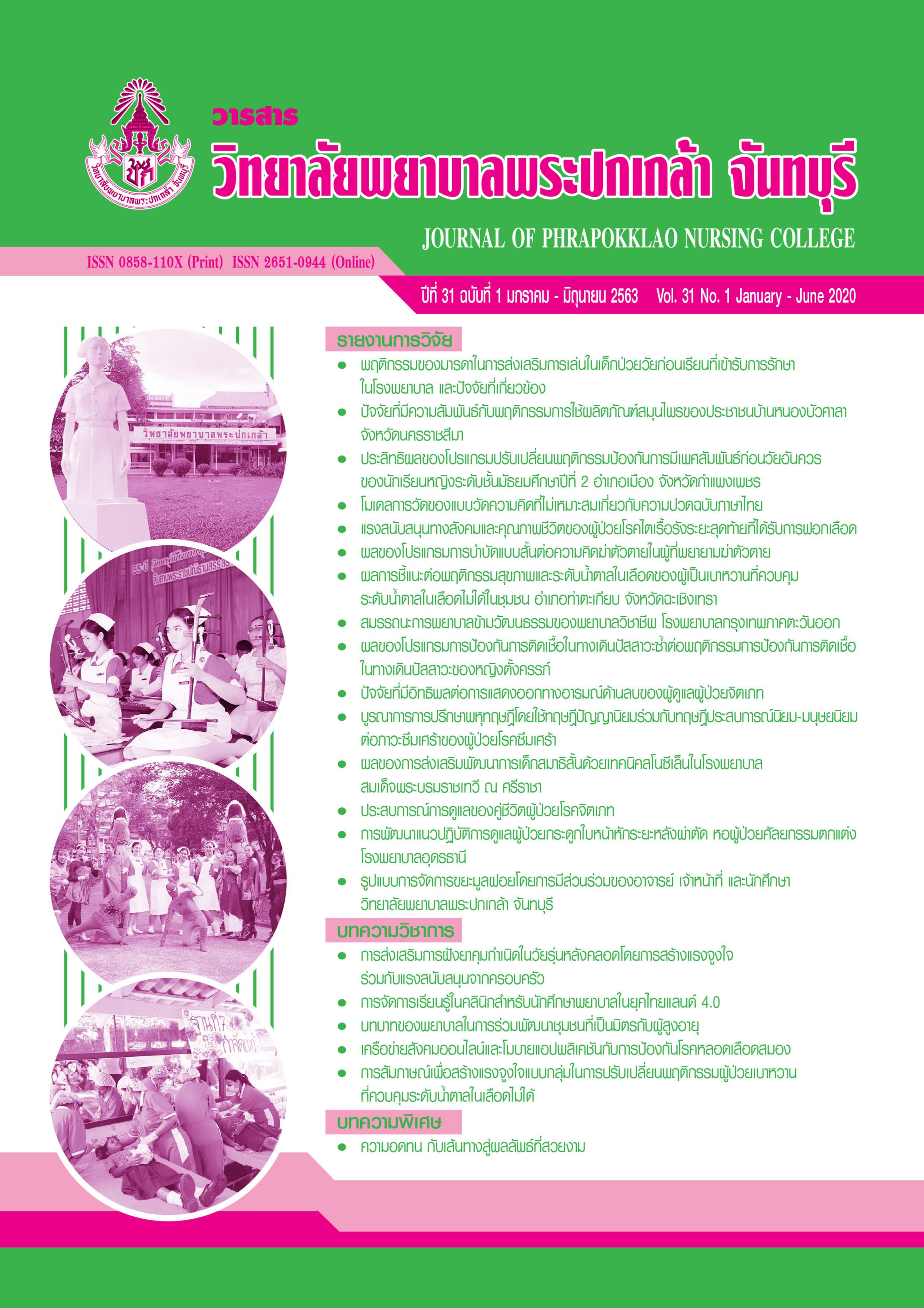Integrative Multitheoretical Counseling: Cognitive Therapy and Experiential-Humanistic Therapy on Depression of Patient with Depressive Disorder
Keywords:
Counseling, Integration, Multitheories, DepressionAbstract
This experimental research aimed to examine the effects of counseling programs on depression among patient with depressive disorder. The participants consisted of 48 patients with depressive disorder receiving services at out-patient department, Sakaeo Rajanagarindra Psychiatric Hospital and were equally divided into four groups; three experimental groups and one control group (12 patients per group). The research instruments included the integration of Cognitive Theory and Experiential-Humanistic Theory counseling program, the Cognitive Theory counseling program, the Experiential-Humanistic Theory counseling program, the Cognitive-Behavioral Theory counseling program, the subjective unit of distress scale, the suicidal assessment form, the mini-mental state examination: Thai version (MMSE-Thai 2002), the psychotic screening form, the demographic questionnaire, and the Beck Depression Inventory (BDI-IA) with the reliability of .86. The implementation and data collection were conducted from January to May, 2018. Statistics used for data analysis included frequency, percentage, mean, standard deviation, and repeated measure ANOVA: one between-subjects variable and one within-subject variable with multiple comparisons by Bonferroni method.
The research results revealed that at the post-trial period, the group receiving the integration of Cognitive Theory and Experiential-Humanistic Theory counseling program (the MTP group) had statistically significant lower mean score of depression than those in the group receiving the Cognitive Theory counseling program (the CT group) and the group receiving the Experiential-Humanistic Theory counseling program (the EXP group), but the MTP group had no different mean score of depression from that in the group receiving the Cognitive-Behavioral Theory counseling program (the CBT group). Additionally, at the follow-up period, the MTP group had statistically significant lower mean score of depression than those in the CT group, the EXP group, and the CBT group.
This research suggests that health care providers relating to depressive psychotherapy should appropriately apply this integration of Cognitive Theory and Experiential-Humanistic Theory counseling program for reducing depression among people with depression.
References
กรมสุขภาพจิต. (2556). ข้อมูลการบริการผู้ป่วยจิตเวชของหน่วยงานสังกัดกระทรวงสาธารณสุข. สืบค้นจาก http://www.dmhmoph.go.th/report/opulation/pop.as
กุลวดี ตนะทิพย์, และเพ็ญนภา กุลนภาดล. (2558). ผลการปรึกษากลุ่มทฤษฎีปัญญานิยมต่อการติดการใช้งานเฟซบุ๊กของนักเรียนมัธยมศึกษาตอนปลาย. วารสารวิทยาการวิจัยและวิทยาการปัญญา, 13(1), 108-117.
ณัชชากัญญ์ วิรัตนชัยวรรณ. (2555). ผลการจัดกิจกรรมการเรียนรู้โดยใช้เทคนิคการสืบเสาะหาความรู้ (5E) เพื่อพัฒนาทักษะกระบวนการทางวิทยาศาสตร์ จิตวิทยา และผลสัมฤทธิ์ทางการเรียนวิทยาศาสตร์ของนักเรียนชั้นประถมศึกษาปีที่ 6 (วิทยานิพนธ์ปริญญามหาบัณฑิต). มหาวิทยาลัยราชภัฏเชียงราย.
นันท์ชัตสัณห์ สกุลพงศ์. (2557). จิตวิทยาการปรึกษาและจิตบําบัดแบบผสมผสาน. วารสารสุขภาพจิตแห่งประเทศไทย, 22(2), 103-114.
นิสรา คำมณี, และวรากร ทรัพย์วิระปกรณ์. (2560). การพัฒนาการปรึกษากลุ่มบูรณาการพหุทฤษฎีระหว่างทฤษฎีอัตถิภาวะนิยมและทฤษฎีเผชิญความจริงเพื่อเสริมสร้างเหตุผลเพื่อการดำรงชีวิตอยู่ของผู้ต้องขังหญิง ในทัณฑสถานหญิง. วารสารวิชาการมนุษยศาสตร์และสังคมศาสตร์ มหาวิทยาลัยบูรพา, 25(48), 59-77.
ลัดดา แสนสีหา. (2546). ความซึมเศร้าและความคิดอัตโนมัติในทางลบของวัยรุ่นตอนปลาย (วิทยานิพนธ์ปริญญามหาบัณฑิต). มหาวิทยาลัยเชียงใหม่.
ศิรินทร์ ภูมิมาลา. (2553). ผลของการปรึกษาเชิงจิตวิทยาแบบกลุ่มตามแนวคิดมนุษยนิยมที่มีต่อการรับรู้คุณความดีและความผาสุกทางจิตใจของนักศึกษาระดับอุดมศึกษา. มนุษยศาสตร์สาร, 12(1), 89-103.
สถาบันเวชศาสตร์ผู้สูงอายุ กรมการแพทย์. (2543). โครงการสำรวจภาวะสมองเสื่อมผู้สูงอายุไทย. นนทบุรี: ผู้แต่ง.
สุรินทร์ สุทธิธาทิพย์. (2557). เอกสารประกอบการสอนเรื่องการบูรณาการทางการปรึกษาและการบำบัดทางจิตวิทยา. ชลบุรี: คณะศึกษาศาสตร์ มหาวิทยาลัยบูรพา.
Brooks-Harris, J. E. (2007). Integrative multitheoretical psychotherapy. Boston, MA: Houghton Mifflin.
Burns, N., & Grove, S. K. (2005). The practice of nursing research: Conduct, critique and utilization (5th ed.). St. Louis: Elsevier Saunders.
Devlin, J. M., & Calley, T. (2007). Applying multitheoretical psychotherapy integration to family therapy. The Family Journal, 15(4), 387-391.
Gloaguen, V., Cottraux, J., Cucherat, M., & Blackburn, I. M. (1998). A meta-analysis of the effects of cognitive therapy in depressed patients. Journal of Affective Disorders, 49(1), 59-72.
Harris, J. E., Kelley, L. J., & Shepard, L. M. (2015). Multitheoretical psychotherapy for depression: Integrating strategies from evidence-based practices. Journal of Psychotherapy Integration, 25(4), 353-367.
McCarthy, K. S., & Barber, J. P. (2009). The multitheoretical list of therapeutic interventions (MULTI): Initial report. Psychotherapy Research, 19(1), 96-113.
Stevens, M. C., Lovejoy, D., Kim, J., Oakes, H., Kureshi, I., & Witt, S. T. (2012). Multiple resting state network functional connectivity abnormalities in mild traumatic brain injury. Brain Imaging and Behavior, 6(2), 293-318.
Downloads
Published
How to Cite
Issue
Section
License
Copyright (c) 2020 JOURNAL OF PHRAPOKKLAO NURSING COLLEGE

This work is licensed under a Creative Commons Attribution-NonCommercial-NoDerivatives 4.0 International License.
เนื้อความ ข้อมูล และรายการอ้างอิงที่ผู้เขียนใช้ในการเขียนบทความเพื่อลงตีพิมพ์ในวารสารวิทยาลัยพยาบาลพระปกเกล้า จันทบุรี ถือเป็นความคิดเห็นและความรับผิดชอบของผู้เขียน คณะผู้จัดทำวารสารไม่จำเป็นต้องเห็นพ้องด้วยหรือร่วมรับผิดชอบ
บทความที่ได้รับการลงตีพิมพ์ในวารสารวิทยาลัยพยาบาลพระปกเกล้า จันทบุรี ถือเป็นลิขสิทธิ์ของวารสารวิทยาลัยพยาบาลพระปกเกล้า จันทบุรี หากหน่วยงานหรือบุคคลใดต้องการนำส่วนหนึ่งหรือทั้งหมดของบทความไปเผยแพร่ต่อเพื่อวัตถุประสงค์ใด ๆ จะต้องได้รับอนุญาตจากบรรณาธิการวารสารก่อน



